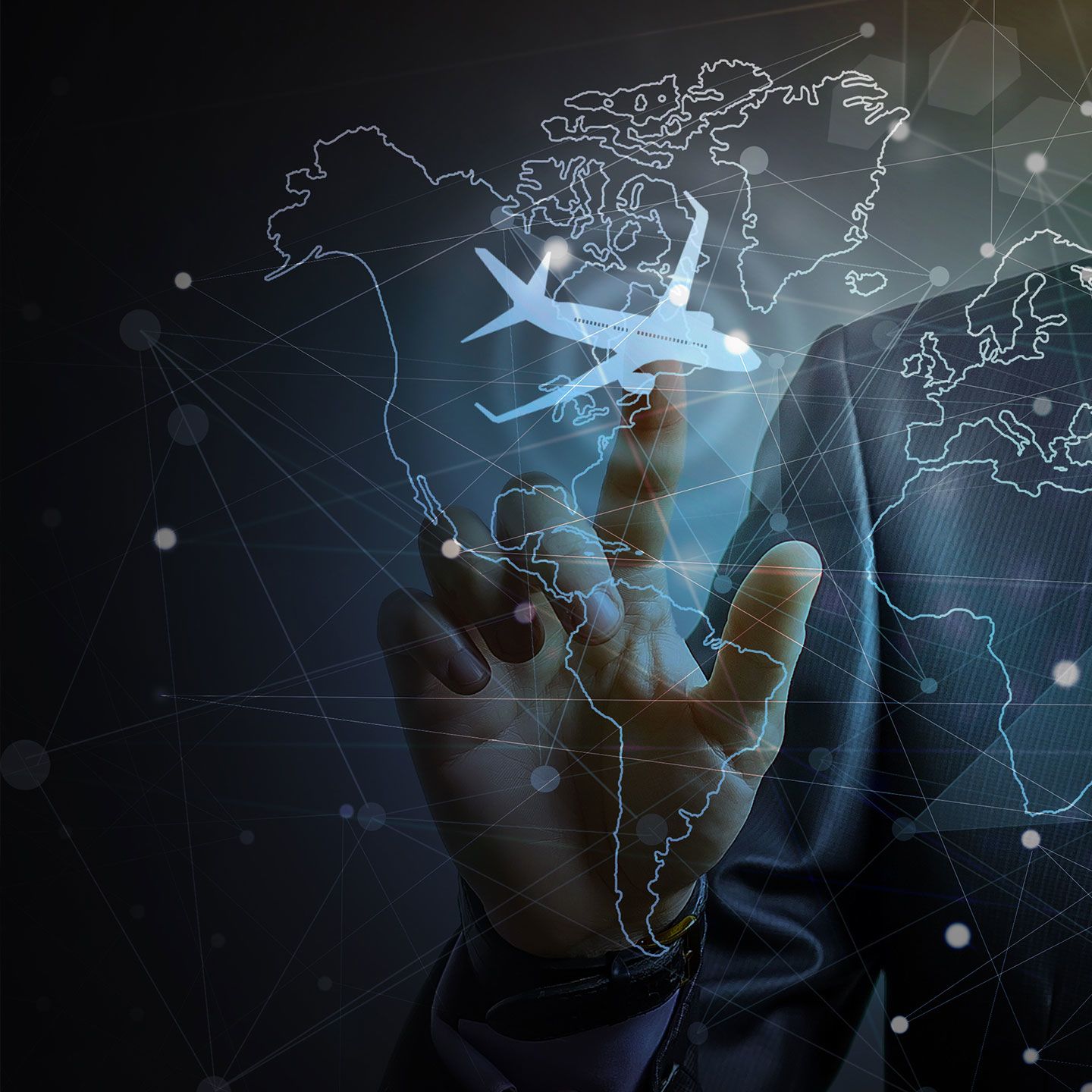Phocuswright's Travel Innovation and Technology Trends 2025
Generative AI and Digital Identity Converge

Introduction
Philip Wolf founded Phocuswright in 1994 on the premise that the world of travel was about to change dramatically due to the rise of a new technology — the internet. Five years later, the first Phocuswright report, then termed the Phocuswright Yearbook, noted that the biggest industry challenges were "customer acquisition, service and retention, fierce competition, an influx of new players and rising marketing and technology costs."
Does this sound familiar? Three decades later, having navigated additional periods of technological disruption during the rise of mobile, social media and the sharing economy, the travel industry stands on the brink of a new era. The rapid emergence of generative AI (GenAI) is poised to bring change that many business leaders agree will be on par or greater than the personal computer or the internet. And very similar predictions and challenges rise to the fore.
That’s why the theme for The Phocuswright Conference 2024 and Phocuswright Europe 2025 is “The New Age(nts).” New agents of change abound as a new age of travel beckons. And the most impactful agent of all in 2025 and beyond will be autonomous, powered by the latest breakthroughs in GenAI. The second most impactful agent of change will be digital identity.
Searching for, booking and experiencing travel, as well as how travel companies operate, are all subject to dramatic change in the coming years as GenAI and digital identity converge. As always, Phocuswright will be on the forefront of navigating this change.


Travelers Embrace GenAI
Phocuswright research is unequivocal in showing that GenAI is proving highly effective for travel. Travelers are adopting it rapidly and are very happy with the results.
Phocuswright’s Travelers and Tech 2024: GenAI, VR and More found that in 2023, 22% of all U.S. travelers were using GenAI for any topic (not just travel), which was less than other popular consumer technologies measured like virtual reality and augmented reality. But in 2024, GenAI leapfrogged to 39% usage, far more than VR and AR – remarkable since those technologies have been around much longer (see Figure 1).
For travel specifically, of those who used GenAI at all in the past year, 46% did so for travel, making it the second most popular topic after entertainment/arts. This places the overall rate of usage of the technology for leisure travel among the traveling population at 18%. Looking forward, in the next 12 months leisure travel will be the top GenAI use case for travelers. This is because most travelers have a very positive view of it. They are most likely to see it as useful and creative (their top concerns relate to safety and accuracy). Being quite happy with it, travelers are significantly more likely to use GenAI again in the next 12 months for all travel use cases (see Figure 2).
In Figure 2, note that travelers were asked about future interest in “Booking/reserving trip components,” since this capability was not possible at the time of the survey. Interest seems moderate, at 40%, but that’s actually quite good. Many people will continue booking travel in the ways they’re used to – on websites and apps or calling – for a long time. But especially for simpler trips, if they’re using GenAI to plan their trip and can get live prices and booking capabilities right inside that environment, a significant number of people will be interested in doing so.
This is why our main trend for 2025 is the significant shift of travel intent into generative chat and search environments, with the anticipation that a meaningful number of bookings will occur there in the next year or two.
Indeed, Google has already started working on integrating bookings into its chat environment. In April 2024 at the Google Cloud Next conference, the company demonstrated flight search inside Gemini (see Figure 3). This has yet to roll out publicly, but obviously it’s coming.
Source: Google Cloud YouTube Channel
Shifts in search and booking will be further driven by autonomous agents – bots that can not only create itineraries and gather information (as they already do well) but can navigate the web and perform actions for travelers, like making bookings and purchases. These agents will increasingly be able to personalize content and recommendations using information they already know about travelers as well as information provided in chat conversations and through digital identity credentials and preferences.
The Trends

This year, we will examine how GenAI and autonomous agents will impact four key areas of travel through a series of public online events titled “The New Age(nts),” which align with four of the trends outlined in this report:
- Impact on Company Operations
- Impact on the In-Destination Experience
- Impact on Travel Distribution
- Impact on Travel Marketing
We also anticipate digital identity becoming more practical and commonly used by humans, with use by autonomous agents not far behind. Digital identity will be integral in assisting autonomous agents in achieving true personalized automation, enabling them to shop and book seamlessly across the spectrum of travel inventory and even proactively manage entire trips. Thus, our fifth trend for 2025 is:
5. Convergence of GenAI With Digital Identity
All of this being said, there are major challenges the industry must overcome to realize the full potential of GenAI and digital identity.
As mentioned in the 2024 report True Automated AI in Travel Is Coming, “One of Gartner’s top ten strategic technology trends for 2024 was the idea of ‘custobots,’ defined as non-human economic actors that can autonomously negotiate and purchase goods and services in exchange for payment. Gartner projects that in five years there will be 15 billion connected products with the potential to behave as customers, with billions more to follow in the coming years.”
This vision impacts all the trends in this report, but chiefly operations, distribution and marketing. Commenting on this paradigm at The Phocuswright Conference 2024, Erik Blachford, a co-founder of Expedia, said: “The outlines of a world in which everybody is represented by an autonomous agent are becoming clear. But it’s very difficult to understand what that means in terms of interaction with all the service providers. Right now, rates and availability are protected from the onslaught of search by channel managers and layers of technology. So, this new world could be the catalyst for a complete revamping of the travel tech stack all the way down to the PMS and GDS.”
In Travelers and Tech 2024: GenAI, VR and More, Phocuswright asked U.S. travelers about various futuristic concepts, including autonomous agents. A significant number of travelers are not at all interested in the concept yet (38%), driven by late adopters of technology (65%) and those 55+ (59%). But notably, 55% of early adopters are very or extremely interested. It will take time to build trust as these agents arrive, but they are anticipated to catch on quickly once accepted.
The New Age(nts) Trend Series

A series of online conversations exploring the impact of generative AI and autonomous agents on the travel industry
Because GenAI advancements are moving so fast, this year we’ve decided to double down on something else we do well – bringing together the industry’s brightest minds for in-depth, timely discussions on the most important trends.
So, rather than publishing reports on our trend topics, we’re hosting this series of public online deep dives. The events will be long-form, in-depth, candid discussions and debates that aim to bring definitive perspective and surface must-know information for each topic. The most important takeaways from each event will be carefully curated and shared afterward.
Watch the recordings of each segment
Part 5: Convergence of AI and Digital Identity
Part 4: Impact on Travel Marketing
Part 3: Impact on Travel Distribution
Part 2: Impact on the In-Destination Experience
Part 1: Impact on Company Operations
As if 2024 hadn’t already given us enough GenAI news, in December OpenAI announced its latest model, o3. While each OpenAI product release has signified breakthroughs in GenAI capabilities, o3 is particularly profound in that it moved the latest standard closer to artificial general intelligence (AGI). It is powered by “chain of thought” reasoning and achieved a staggering 87.5% on the ARC-AGI benchmark, a metric that tests reasoning and problem-solving capabilities and is designed to measure AI’s ability to perform intellectual tasks at a human level. The benchmark identifies a score of 85% as a “pass” for AGI.
Also in December, Google announced Gemini 2.0, their newest model for the agentic (powered by autonomous agents) era. Gemini 2.0 is a significant leap forward for Google, designed to handle real-time data integration, complex reasoning and contextual adaptation. This followed reporting on Project Jarvis, Google’s initial take on an agentic framework, in October.
Reasoning, problem solving and ability to adapt are the types of breakthroughs that will meaningfully reduce the hallucinations that large language models are plagued by, and allow autonomous agents to operate reliably with little oversight.
Perhaps most consequentially, in late January, OpenAI launched “Operator,” its long-awaited foray into the agentic world. As with many GenAI product launches from major tech companies, the announcement featured a screenshot of a travel-related use case: “find and book me the highest rated one-day tour of Rome on Tripadvisor.” Other travel-related launch partners include Booking.com, Priceline, Uber and Hipcamp. Initially only available to Pro users ($200/month) as a research preview, it will have broad consumer impact once it is released publicly and affordably, likely later this year.
“We are now confident we know how to build AGI as we have traditionally understood it,” OpenAI’s CEO Sam Altman wrote in a blog about o3 titled “Reflections,” posted on January 5. “We believe that, in 2025, we may see the first AI agents ‘join the workforce’ and materially change the output of companies.”
Which makes for a perfect segue to our first trend:
Impact on Company Operations

Travel companies are already streamlining their operations using GenAI, from customer service to sales and marketing to content creation. But bigger disruption is on the horizon, with autonomous agents powered by GenAI models like o3 capable of superior logic and understanding poised to challenge human capabilities. The close of 2024 and dawn of 2025 brought a flurry of announcements about autonomous agents related to company operations.
In December, Google launched Agentspace, aiming to “unlock enterprise expertise for employees with agents that bring together Gemini’s advanced reasoning, Google-quality search, and enterprise data, regardless of where it’s hosted.”
Also in December, Salesforce launched AgentForce 2.0, a “digital labor platform for enterprises, enabling a limitless workforce through AI agents for any department…” CEO Marc Benioff, a major evangelist of AI-powered agents, envisions one billion AI agents being in service by the end of 2026 and referred to the market opportunity for them as being in the trillions of dollars. He also said Salesforce might not hire any software engineers in 2025 due to productivity boosts from AI.
Echoing similar sentiments in January, amid a slew of product announcements in a keynote presentation at the Consumer Electronics Show, Nvidia CEO Jensen Huang also referred to agents as a multi trillion-dollar opportunity and went as far as to say that “…in a lot of ways, the IT department of every company is going to be the HR department of AI agents in the future.”
The implication of these announcements is that autonomous agents are expected by market-leading CEOs to significantly increase automation in companies this year. Employees may no longer need to learn complex systems because they can simply ask an AI assistant for answers, which could have major implications for SaaS software. They could also soon use the latest AI tools like Replit Agent to build custom software that meets their exact needs using only natural language.
While in the long term it’s possible that AI could replace workers, in the shorter term the focus will be on improving efficiency and productivity of humans. It could be argued that as humans become more efficient, the competitive bar will remain level, preventing significant job losses.
As a deluge of autonomous agents join the ranks of companies, they’ll also be shopping on behalf of travelers. This could exponentially increase the number of inbound inquiries, including on call centers via automated phone calls, requiring better web infrastructure and either more people or more automated solutions to handle the call volume.
AI needs clean data to work with, and travel data is notoriously messy. Most travel still companies have a lot of cleaning up to do to be prepared for this era. Companies like Snowflake are assisting with this, for which they received the Launch pitch competition “Innovator of the Year” award at The Phocuswright Conference 2024.
To help navigate these complex issues, some companies are choosing to bring in chief AI officers and other dedicated AI executives.
Impact on the In-Destination Experience

The latest GenAI models, capable of real-time voice conversation and using computer vision to understand surroundings, stand to revolutionize how travelers tour neighborhoods and sights of interest, get recommendations and interact with locals.
In Travelers and Tech 2024: GenAI, VR and More, we asked U.S. travelers about their interest in taking a tour using an AI tour guide and using AI to translate verbal conversations in real time. Interest in both concepts is tempered, likely because they’re so new. Yet less than a quarter were not at all interested in either.
OpenAI demonstrated some of these capabilities in May 2024 when it launched its 4o model. (AI tour guide) (real-time verbal translation). In conjunction with its launch of Gemini 2.0 in December, Google published a video demonstrating its Project Astra as an AI assistant helping a person explore London.
Source: Google YouTube Channel
Smart glasses with GenAI and augmented reality built in have the potential to make exploring and translating much easier than through the phone screen. A variety of smart glasses options are now available commercially and price points are becoming more affordable.
The local tour market could be transformed by the highly personalized capabilities of AI-powered guides as well as autonomous vehicles, which could enable unlimited customized tour routes in contrast to big bus tours. Tour content could be provided by in-car media systems or even travelers’ phones.
As well, travelers will likely increasingly rely on their AI assistants as in-destination concierges as they get better at providing real-time advice, including suggestions for things to do, making edits to itineraries based on weather, and even making automated tour or restaurant reservations.
Impact on Travel Distribution

Industry discourse is intensifying over whether autonomous agents, capable of shopping and booking on behalf of travelers, will provide an innate advantage to suppliers or intermediaries (OTAs) in the coming years. Also up for debate is how they will affect distribution infrastructure. Industry stakeholders assert strong and conflicting views, vigorously debating how and why these agents are likely to reshape the dynamics of travel distribution.
The main argument in favor of the OTAs gaining ground is that they have always excelled at technology and distribution, and this time will be no different. They have the technology budgets and know-how to build world-class solutions for this new era of online distribution and the ability to pay for mass referral traffic, both tactics they’ve used in the past to outcompete suppliers.
On this side of the argument, it has been posited that advertising revenue will remain paramount, where “cost per click” could shift to “cost per agentic search,” and autonomous agents will trust and favor large brands just as search engines historically have. OTAs would also retain data advantages over suppliers, particularly in creating self-optimizing feedback loops from both human and agent browsing data.
Other agreeing opinions further argue that the OTAs will move faster than suppliers in this new era and have a natural advantage in leveraging their three decades of technology development. They are already adept at traversing the maze of travel distribution systems (millions of accommodations, thousands of experiences, hundreds of airlines) which will be needed by agentic systems to shop efficiently.
On the other side, the main argument against the OTAs is that generic agents will strive to get as close to the source of inventory as possible and thus will favor going direct to suppliers. And they’ll have the means to do so, whether by connecting via API for more sophisticated suppliers or by the low-tech approach of mimicking human behavior – browsing and booking via websites or even phoning call centers in the case of less sophisticated suppliers such as independent hotels.
Some say that for these and other reasons, OTAs’ value will decline sharply in the coming years. They argue that much of the value OTAs have built is in marketing prowess and user experience, two things that autonomous agents won’t be influenced by, and that while the OTAs have tech advantages, they are too big to adapt as quickly as needed.
Others argue that the platform advantages the OTAs have established, such as economies of scale, network effects and low marginal costs, will evaporate as autonomous agents gain the ability to search and book travel products across the entire internet, rendering each OTA just a subset of available options. Still others agree that OTAs could be pushed down the value stack with diminishing margins, yet take a more neutral stance as to where OTAs could still win.
A neutral outcome is certainly possible; autonomous agents will be able to book where a user instructs them, and loyalty will be a factor, as well as perceived service level among providers. Outcomes will vary greatly depending on how the agent is instructed, how complex the trip is and the level of involvement of the traveler. If and when travelers trust autonomous agents enough, they could eventually make the best booking without oversight. Most likely, though, agents would present the best options for the traveler’s review, solicit decisions and then go do the dirty work of completing the booking(s).
The possibility of billions of agents interacting with current distribution infrastructure in the coming years raises some red flags. While the industry is no stranger to screen scraping, bots that directly represent consumers, and lots of them, are a different story. New infrastructure could be needed to handle them, such as a middleware agent layer that directs a subset of purpose-built agents to properly route queries. Analytics, revenue models, content creation and optimization and security assessments could all need re-thinking as a result.
Impact on Travel Marketing

Online visibility is shifting fast as Google’s AI Overviews – GenAI-created summaries of search results – affect SEO traffic, and travelers increasingly turn to AI platforms like ChatGPT and Perplexity for answers. In line with Phocuswright’s legacy of helping the industry measure the shift from offline to online and then to mobile, we’ll continue to provide the numbers that matter and will ramp up our efforts to measure the shift to generative environments this year.
For now, a variety of third-party data points punctuate a drastic shift currently taking place. A recent report from BrightEdge, an enterprise SEO platform, showed that AI Overviews in the travel industry increased by 700% from September to October 2024 (see Figure 4). These GenAI summaries went from being displayed for only 1% of travel-related keywords in September to nearly 30% by the end of October.
A similar analysis conducted in a similar timeframe by a top search marketing consultant found that “Google is now showing AI Overviews in the travel space, and they spiked to ~6% of queries in November.”
A recent PhocusWire whitepaper produced in conjunction with travel and tourism marketing agency Propellic found that “search features such as AI Overviews in Google have resulted in deteriorating clickthrough rates. Clickthrough rates on Google in the travel segment have gone down considerably, declining from 30.38% in October 2023 to 16.25% in October 2024... This has particularly impacted top-of-funnel (inspiration-stage) content, leaving most bottom-of-funnel click-through rates widely unchanged.”
That’s just what’s happening within search engines. The public is increasingly starting its queries inside dedicated GenAI platforms. A recent analysis posted on LinkedIn by SEO guru Rand Fishkin calculated that as of October 2024, ChatGPT commanded 4.33% of all search, which may not sound like much but is a bigger share than Bing and almost as big as YouTube. Furthermore, a December 2024 joint report from SEMRush and Statista (loaded with useful statistics) found that overall, “one in 10 U.S. internet users now turn to generative AI first for online search.”
While previously ChatGPT didn’t feature many external links in answers, in October 2024 the company launched its web search functionality that now features prominent links to referenced websites. Once again, the first example given in the announcement was travel-related: “help me plan a road trip along the Amalfi coast.”
These shifts in how and where travelers are searching obviously have big implications for how much traffic is going to travel websites. In turn, they have implications for how companies in the Google ecosystem need to adapt (almost everyone) and for how Google in particular might monetize travel going forward.
Convergence of GenAI With Digital Identity

Digital identity, and self-sovereign ID in particular (defined as a digital ID that the user has complete ownership and control of), holds immense promise. Once fully realized, it will be easy for travelers to store their identity credentials as well as their payment information and personal preferences in one secure place and use them anywhere in their travels, from shopping to booking to in-destination.
For shopping, the vision is that travelers will be able to connect their digital wallet to travel sites or apps, using a QR code as one example method, so their personal preferences stored in their wallet are automatically applied to their search. Thus, customers will no longer be compelled to select checkboxes and filters across myriad shopping websites. Just a one click connection applies all presets in each case.
Identity credentials and payment information can be stored in digital wallets too. This enables the traveler to check out with another single click, as name, address and credit card information would all be transmitted seamlessly from the digital wallet to the merchant as needed.
There are plenty of uses of digital identity on-trip as well, pairing with biometrics to streamline everything from airport security to hotel check-in. This powerful combination could finally enable the idea of the “connected trip,” acting as the glue that ties the disparate, disconnected elements of today’s itineraries together, enabling smart actions such as informing rideshares or hotels if a flight is delayed.
While digital identity technology is still nascent, it will get a boost soon. China and Europe are leading the way in rolling out digital ID initiatives. In Europe, by 2026 every EU member state is required to provide its citizens with a digital identity wallet. Opinions vary on whether this timeline is realistic, and even once offered, there’s no guarantee of usage. But the die is cast and the benefits offer good incentives: for travel providers, less liability for customers’ personal data; and for travelers, ease and convenience. Gartner predicts at least 500 million smartphone users will be using a digital identity wallet by 2026.
In Travelers and Tech 2024: GenAI, VR and More, U.S. travelers were also asked about the interest in digital ID. Most interest was slight/moderate, at 50%. The lukewarm sentiment could be due to privacy concerns or a lack of understanding of the full benefits and drawbacks.
While digital identity is trend worthy on its own, it has specific importance to autonomous agents. Humans will be the primary users of digital ID in the near future. But eventually, the agents will be able to use travelers’ IDs as they shop on their behalf. Imagine a traveler’s AI agent connecting to many different supply options and having permission to easily and efficiently share preferences, loyalty status, etc. with each. Then the agent could find the very best customized deals with the best bang for the buck or meeting specific goals, such as maximizing loyalty points.
It will be of the utmost importance for autonomous agents to easily and reliably verify who they are and that they have permission to take specific actions on behalf of customers. If this doesn’t work flawlessly, fraud and expensive errors could abound. Properly implemented digital identity is arguably the only solution to the problem, making adoption nearly inevitable if autonomous agents live up to their promise and are wholly embraced by travelers.
Register now for the event series
The latest GenAI models, capable of real-time voice conversation and using computer vision to understand surroundings, stand to revolutionize how travelers tour neighborhoods and sights of interest, get recommendations and interact with locals. For the many travelers embracing AI tools, how will the in-destination experience be transformed in the next few years?
Registration to the online event series gives you access to all of the online events. Dates are subject to change.
WEEKLY RESEARCH INSIGHTS
We dig deep to give you the data and trends that drive the travel, tourism and hospitality industry.
Get the latest in travel industry highlights with our free weekly research articles and more. Sign up to get the latest delivered directly to your inbox.
FOR MORE INSIGHTS
See all of Phocuswright's free research insights here.
Sign up to get the latest delivered directly to your inbox.
Open Access Research Subscription
Research is our priority. Our Open Access research subscription puts the world’s most comprehensive library of travel research and data visualization at your fingertips.
Clients have relied on Phocuswright's deep industry knowledge for over 25 years to power great decisions, help justify a pitch, build a strategic plan and elevate any presentation through trusted research and data. When companies and executives reference Phocuswright, they gain the trust of an industry keen on data, trends and analytics.
See the full benefits of an Open Access subscription here.
Contact Us
For any questions you may have, please call or email us at
📱 +1 860 350-4084
📧 info@phocuswright.com
About Phocuswright
Events
FAQ
Copyright
Contact Us
Research
News
Privacy & Terms
Press Room
Email Updates
Register for Phocuswright emails about research data, events and more:
A WHOLLY OWNED SUBSIDIARY OF
Copyright © 2024 by Northstar Travel Media LLC. All Rights Reserved. PO Box 760, Sherman, CT 06784 USA | Telephone: +1 201 902-2000
The Phocuswright Conference • Phocuswright Europe • Global Startup Pitch • Travel Tech Fellowship • Phocuswire • Web In Travel • Inntopia • Retail Travel • Hotel Investment













